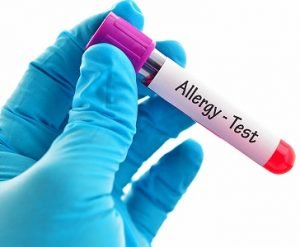Book An Appointment
+91- 9326457032Send us a Mail
info@drsanglikarpulmonarycare.comOur Location
Doctors Planet, Hiranandani Business Park, Hamilton, A Wing, 205/207, Ghodbunder Road, Patlipada, Thane West 400607Allergy Testing and Immunotherapy

Today many people are suffering from respiratory allergies due to increasing Air Pollution. In India, Air Pollution is rapidly increasing in metro cities as well as in villages. The toxic substances present in the polluted air not only enter our body after breathing but also affects functions of heart and lungs. Allergies occur due to the weak immunity system.
Air pollution is one of the main reasons for the occurrence of allergic respiratory diseases. Polluted air contains various toxic chemical particles such as carbon dioxide, ammonia, sulfur dioxide, nitrogen and carbon monoxide. Diesel emission from vehicles is the major cause of urban air pollution. The exposure of diesel emissions and airborne allergens increases allergen-specific levels, severity of asthma, inflammation and airway hyper-responsiveness.
Common causes of Allergic Respiratory Diseases
Allergic respiratory diseases mainly occur due to various internal and external factors such as
- Diesel emission from vehicles
- Emission of harmful gases from manufacturing, refinery and mining industries
- Pollen from grass, trees and weeds
- Burning of Fossil fuels and other agricultural activities
- Cigarettes smoke
- Perfumes or Room fresheners
- Cleaning products having strong odors
- Dust mites, Pet hair, Bird Dander and Cockroaches
Common allergy symptoms:
In most of cases, common allergy symptoms are seen such as
- Runny nose, stuffy nose and sneezing
- Wheezing and shortness of breath
- Mild or severe coughing
- Headache
- Weakness
- Nausea and vomiting
- Fever
- Rashes
Most common Allergic Respiratory Diseases:
- Sinusitis – It is the inflammation of mucus membrane in the sinuses. It is caused by infection, allergies and toxic substances present in the air.
- Asthma – It is the common respiratory disease affecting airways which carry air into and out of the lungs. Asthma can get anyone at anytime. It is most likely to occur in children by age 5 and in adults in their 30. People suffering from allergy are more easily to get asthma.
- Allergic Rhinitis – It is also known as Hay fever. Allergic Rhinitis mainly occurs due to Grass Pollen. Asthma increases the risk of Allergic Rhinitis. Various external factors like wood and cigarettes smoke, fumes, air pollution and cold temperature triggers the Allergic Rhinitis.
Allergy testing:
Allergen is the major substance which causes allergy. Allergy testing is very helpful to determine exact allergy type, disease and treatment options.
Types of allergy tests are:
- Skin test: Skin tests are used to identify numerous potential allergens. This includes airborne, food-related and contact allergens. The three types of skin tests are scratch, intradermal and patch tests.
- Blood test: Blood tests are done in case of severe allergy reactions. Blood is testes in the laboratory to detect type and severity of allergen.
- Imaging test: It includes CT scan and X-ray of chest. This test is useful to detect Asthma and other lung diseases.
- Gastroesophageal reflux assessment: This test is used to detect Gastroesophageal reflux disease (GERD).
- Lung function test: Spirometry is the most common lung test which is used to detect asthma and COPD.
Immunotherapy
Immunotherapy is a treatment which is used to repair and stimulate body’s immunity system to fight diseases. It is a type biological therapy. Allergy shots are a form of treatment known as immunotherapy. Allergy shots are injections given to allergic patients at regular intervals over a period of approximately three to five years to stop or reduce allergy attacks.
Each allergy shot contains small amount of the specific substance which reduces effect of allergic reactions. These are called as allergens. Allergy shots contain required amount of allergens to stimulate immune system but not enough to cause a full-blown allergic reaction.
Doctor increases the dose of allergens in each of allergy shots after some time. Immunity system builds up a tolerance to the allergens causing allergy symptoms to vanish over time.
Benefits of Immunotherapy:
- Allergy medications don’t control or stop symptoms. In this case, Immunotherapy is the best treatment option to control or cure allergy
- Immunotherapy do not have any side effects
- Immunotherapy is useful to avoid long term dependence of medicines.
Allergy shots can be used to control symptoms such as:
- Seasonal Allergies – Immunotherapy is used for common seasonal allergic asthma and sinusitis. An oral type of immunotherapy is available for pollen, ragweed and grass allergies.
- Indoor Allergens – Immunotherapy is used control to indoor allergens such as dust mites, cockroaches, mold or dander from pets such as cats or dogs. Oral allergy immunotherapy is available for dust mite allergy.
- Insect stings – Allergic reactions to insect stings can be triggered by bees, wasps, hornets or yellow jackets.
Allergy symptoms don’t stop or control overnight. They usually improve during the first year of treatment but the most noticeable improvement often happens during the second year. Most people are desensitized to the allergens contained in the shots in third year. In this way, people who have undergone immunotherapy can resist allergic reactions.
We have most advanced Allergy Testing and Immunotherapy facilities.
